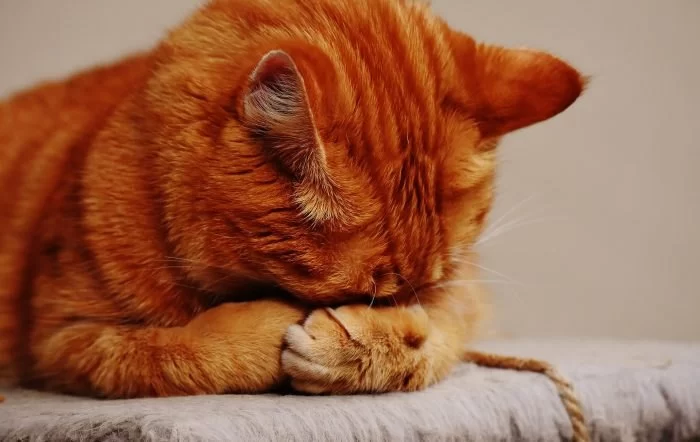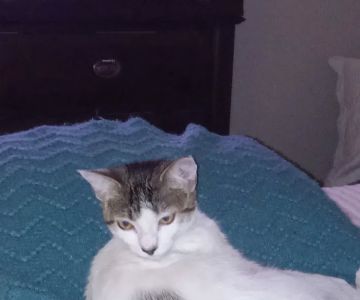How to Treat Anxiety in Elderly Cats: Understanding and Managing Feline Anxiety
As cats age, they can experience various changes in their behavior and health, including the onset of anxiety. Just like humans, elderly cats may face stressors such as changes in their environment, routine, or even physical health issues that can cause anxiety. Understanding how to identify and treat anxiety in elderly cats is crucial for maintaining their quality of life and ensuring they remain healthy and happy in their golden years.
Signs of Anxiety in Elderly Cats
Before you can effectively treat anxiety in elderly cats, it's important to recognize the signs. Cats are masters at hiding discomfort, so spotting behavioral changes early can make a big difference in treatment. Some common signs of anxiety in elderly cats include:
1. Increased Vocalization
If your normally quiet cat starts yowling or meowing excessively, it could be a sign of anxiety. Older cats may vocalize more when they feel unsettled or scared, especially during unfamiliar situations or when they are feeling disoriented due to cognitive decline.
2. Hiding or Withdrawal
Cats experiencing anxiety may hide more than usual, retreating to quiet or dark spaces. While some cats enjoy alone time, a sudden increase in hiding behavior can be a sign of stress or anxiety, especially if they are avoiding social interactions that they previously enjoyed.
3. Litter Box Issues
Inappropriate urination or defecation can sometimes be linked to anxiety, especially in elderly cats. They may avoid using the litter box because they associate it with stress or discomfort, or they may experience cognitive decline, which affects their memory and ability to remember where the litter box is located.
4. Aggressive or Unusual Behavior
Older cats with anxiety may become more aggressive or exhibit unusual behaviors. They may swat or scratch when they normally wouldn’t or act out when they’re feeling threatened or overwhelmed. This behavior can also be a result of pain or cognitive dysfunction, so it’s important to rule out other health issues first.
Common Causes of Anxiety in Elderly Cats
Understanding the underlying causes of anxiety in elderly cats can help you treat them effectively. There are several factors that can contribute to anxiety in older felines:
1. Cognitive Dysfunction Syndrome (CDS)
Similar to dementia in humans, Cognitive Dysfunction Syndrome (CDS) is a condition that affects many elderly cats. It can cause confusion, disorientation, and anxiety. Cats with CDS may forget familiar people or places, which can lead to stress and behavioral changes. If your senior cat shows signs of cognitive decline, it’s important to speak to your vet for proper diagnosis and treatment.
2. Pain or Discomfort
Older cats are more likely to experience chronic pain from conditions like arthritis or dental disease. Pain can contribute to anxiety, especially if it causes the cat to feel trapped or vulnerable. If your cat is displaying signs of pain (such as limping or difficulty jumping), consult your veterinarian to address any underlying medical issues.
3. Environmental Changes
Older cats may struggle to adjust to changes in their environment. A move to a new home, the arrival of a new pet, or even changes in the household routine can all cause anxiety in senior cats. It’s important to maintain a stable, predictable environment to help reduce stress.
4. Separation Anxiety
As cats age, they may develop a stronger attachment to their owners. If they are left alone for extended periods, they may experience separation anxiety. This can manifest as destructive behavior, vocalization, or excessive grooming. Understanding their need for companionship and providing them with more comfort during times of separation can help alleviate their anxiety.
How to Treat Anxiety in Elderly Cats
Treating anxiety in elderly cats requires a combination of behavioral strategies, environmental adjustments, and sometimes medications. Below are some steps you can take to help your senior cat feel more secure and less anxious:
1. Create a Safe and Comfortable Space
Providing a designated quiet area where your cat can retreat when they feel anxious is essential. This space should include a comfortable bed, familiar items (like their favorite blanket or toy), and a litter box. Ensuring that their environment is peaceful and calm can help reduce stress.
2. Maintain a Consistent Routine
Cats thrive on routine. Try to keep feeding times, playtime, and other daily activities consistent. Predictability can help reduce anxiety, especially in cats suffering from cognitive decline. You may also want to use pheromone diffusers (like Feliway) to create a calming atmosphere in your home.
3. Mental Stimulation and Enrichment
Engaging your senior cat in regular mental stimulation activities can help combat anxiety. Puzzle toys, interactive games, and providing opportunities for climbing or exploring can keep their mind sharp and reduce anxiety. Gentle, interactive playtime can also help strengthen your bond with your cat, making them feel more secure.
4. Consult with Your Veterinarian
If your cat’s anxiety persists or worsens, it’s important to consult your veterinarian. They may recommend medications or supplements to help alleviate your cat’s anxiety. Common options include anti-anxiety medications or natural supplements like CBD oil, L-theanine, or melatonin, which are sometimes prescribed to help calm anxious cats.
5. Provide Companionship and Comfort
Older cats often benefit from additional companionship and comfort. If your cat is prone to separation anxiety, try to spend more time with them. Some cats may also benefit from another pet, especially if they are more social. However, introducing a new pet should be done gradually and with caution to avoid causing additional stress.
How Hidden Brook Veterinary Can Help
If your elderly cat is showing signs of anxiety, Hidden Brook Veterinary is here to help. Our team can provide a thorough evaluation of your cat’s health and behavior, helping to identify any underlying medical issues or anxiety triggers. We offer tailored treatment plans, including behavioral therapy, medication recommendations, and tips for managing your cat’s anxiety in their golden years. Visit our website to learn more and schedule a consultation with one of our experienced veterinarians.












